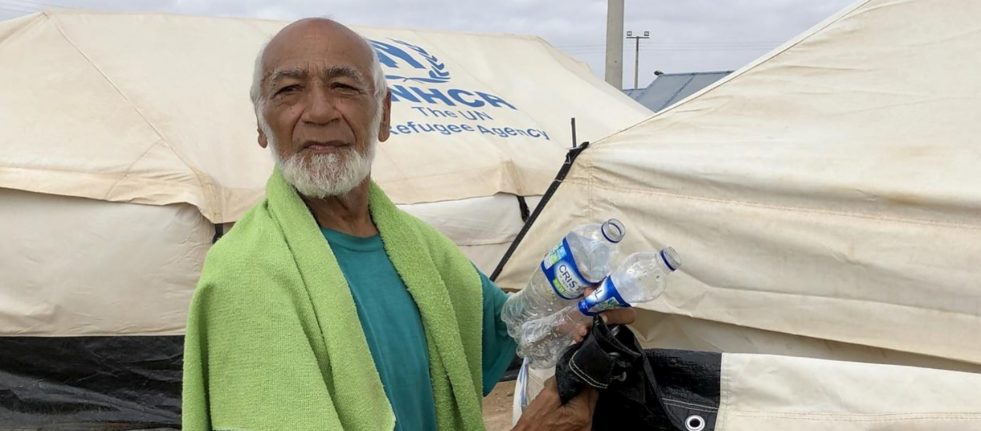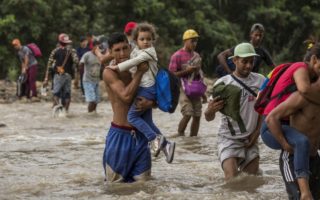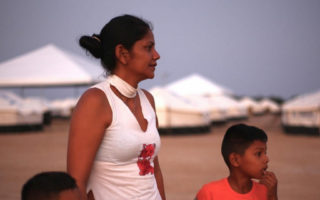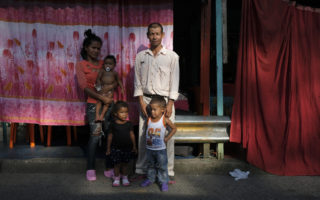
Domingo, 72, a former university librarian from Venezuela, stands outside a temporary shelter near Colombia’s northern La Guajira region. © UNHCR/Olga Sarrado Mur
A UNHCR survey finds that half of Venezuelans who have fled are particularly vulnerable due to their age, health issues, or the choices they had to make to survive.
By Olga Sarrado Mur in Maicao, Colombia
Recurring blackouts in the Venezuelan city of Maracaibo took a terrible toll on the whole population. But they were particularly rough on Adrianna,* a 24-year-old woman with a cognitive impairment that stopped her intellectual development at around age six.
Without power, her mother Carolina* could no longer play Adrianna the music or TV shows she had long relied on to soothe her.
Carolina was also an activist for the opposition and as the situation in Maracaibo deteriorated, with blackouts ever more frequent and longer lasting, the family was denied access to basic services in retribution for their political activism.
Without access to water, TV or music, Adrianna began to lash out, tearing at her own hair and hurting herself. Given Adrianna’s worsening condition, as well as the daily repression they were facing for their political stances, the family saw no other choice but to leave.
“They were always creating obstacles,” said Carolina. “We couldn’t see our daughter in such a desperate situation.”
“They were always creating obstacles … We couldn’t see our daughter in such a desperate situation.”
The family fled Venezuela, seeking safety in the Andean nation of Ecuador.
Stories like those of Adrianna and Carolina are tragically common among the estimated four million Venezuelans seeking safety outside their native country. A new protection monitoring report by UNHCR, the United Nations Refugee Agency shows that over 50 per cent of Venezuelan refugees and migrants interviewed face acute, specific risks during their journey.
Age, gender, health or other needs render half of the Venezuelans fleeing, like Adrianna, particularly vulnerable and in urgent need of protection and support. Others have had to resort to high-risk practices to cope during their journey, such as sex work, begging or sending their underage children to work.
Such was the case of Sajary*, a 20-year-old transgender woman who left Venezuela for Brazil in search of medicines for her sick mother. Getting to Brazil had eaten up most of Sajary’s money and, with no one to rely on, she was hard-pressed to afford a place to live – let alone pay for food or her mother’s treatment. She found herself facing a terrible choice.
“I didn’t know what to do,” recalled Sajary, who crossed the border into the Brazilian state of Roraima back in February, 2018. A friend brought up the possibility of sex work as a way to survive. “I’d never done that before, but I thought that if I didn’t, I wouldn’t be able to eat. I’d have to sleep on the streets.”
She could not cope with the work and quickly gave up, only to find herself sleeping on a piece of cardboard in a square in Boa Vista, Roraima’s capital. “I was eating once a day,” she said.
Domingo,* meanwhile, was 72 years old when he arrived, alone, in Maicao, Colombia. A librarian by profession, he spent 25 years working at one of Venezuela’s top universities. But by the time he arrived in Maicao, it had been weeks since Domingo had eaten a proper meal. He could not help but toy with the idea of giving up his battle to stay alive.
“I often feel useless,” he said. “I feel I could still be productive, but I’m alone, I have nothing with me and nobody wants to employ or rent a house to someone of my age.”
“Access to employment, accommodation and documentation are some of the priority needs of refugees and migrants from Venezuela, as evidenced by the protection monitoring report,” said Renata Dubini, UNHCR Americas Bureau Director.
“The report also shows how difficult it is for Venezuelan refugees and migrants to access their basic rights. Despite the solidarity and efforts by the main host countries in the region, only increased support from the international community can lead to a strengthened response to better meet the specific needs of the most vulnerable,” she added.
While hosting countries have shown generosity in opening their doors to refugees and migrants from Venezuela, they do not always have the capacity to provide much-needed assistance, especially for those with special needs, like Domingo and Adrianna. Host countries have also struggled to ensure Venezuelans are not forced to resort to high-risk behavior, like Sajary.
“I have nothing with me and nobody wants to employ or rent a house to someone of my age.”
After a week sleeping on the streets of Boa Vista, Sajary was approached by a UNHCR official who found her an opening at a temporary shelter. Three months later, she took part in a programme, led by the Brazilian government and supported by UNCHR and other UN agencies, which relocates Venezuelans in Boa Vista to other Brazilian cities with better job and integration prospects.
Sajary was relocated to the Amazonian city of Manaus and referred to Brazil’s first shelter specifically for Lesbian, Gay, Bisexual, Transgender and Intersex – or LGBTI – refugees. Since then, she has found a partner and a place to call home. She is still searching for a job.
In Ecuador, Adrianna has access to the TV shows and music she needs to relax. She is no longer harming herself, and her hair has begun to grow back. She also enrolled in a weekly dance class that has helped her find peace. However, her family has yet to find a school where she can receive the specialised support she needs.
Domingo is in a temporary shelter near Colombia’s northern La Guajira region, regrouping as he considers his next steps.
UNHCR supports the efforts by Latin American countries to harmonize their policies and practices, coordinate the humanitarian response and improve access to services and rights for Venezuelan refugees and migrants.
The protection monitoring report is based on a survey of nearly 8,000 Venezuelan families who fled their homes, and was conducted in eight countries throughout Latin America and the Caribbean between January and June 2019.
In addition to providing crucial data about this population and its needs, the survey has already resulted in concrete actions, with over 1,500 participants referred for counseling or services as a result.
Additional reporting by Ilaria Rapido in Quito, Ecuador and Victoria Hugueney in Manaus, Brazil.
*Last names removed for protection reasons.
DONATE TO VENEZUELAN REFUGEES TODAY
Originally posted by UNHCR on 19 July 2019





